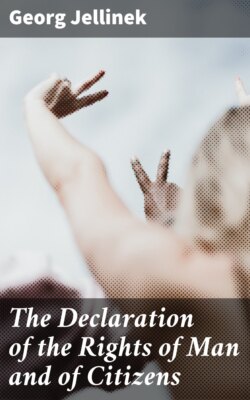Читать книгу The Declaration of the Rights of Man and of Citizens - Georg Jellinek - Страница 5
CHAPTER II.
ОглавлениеROUSSEAU'S CONTRAT SOCIAL WAS NOT THE SOURCE OF THIS DECLARATION.
In his History of Political Science—the most comprehensive work of that kind which France possesses—Paul Janet, after a thorough presentation of the Contrat Social, discusses the influence which this work of Rousseau's exercised upon the Revolution. The idea of the declaration of rights is to be traced back to Rousseau's teachings. What else is the declaration itself than the formulation of the state contract according to Rousseau's ideas? And what are the several rights but the stipulations and specifications of that contract?[7]
It is hard to understand how an authority upon the Contrat Social could make such a statement though in accord with popular opinion.
The social contract has only one stipulation, namely, the complete transference to the community of all the individual's rights.[8] The individual does not retain one particle of his rights from the moment he enters the state.[9] Everything that he receives of the nature of right he gets from the volonté générale, which is the sole judge of its own limits, and ought not to be, and cannot be, restricted by the law of any power. Even property belongs to the individual only by virtue of state concession. The social contract makes the state the master of the goods of its members,[10] and the latter remain in possession only as the trustees of public property.[11] Civil liberty consists simply of what is left to the individual after taking his duties as a citizen into account.[12] These duties can only be imposed by law, and according to the social contract the laws must be the same for all citizens. This is the only restriction upon the sovereign power,[13] but it is a restriction which follows from the very nature of that power, and it carries in itself its own guarantees.[14]
The conception of an original right, which man brings with him into society and which appears as a restriction upon the rights of the sovereign, is specifically rejected by Rousseau. There is no fundamental law which can be binding upon the whole people, not even the social contract itself.[15]
The Declaration of Rights, however, would draw dividing lines between the state and the individual, which the lawmaker should ever keep before his eyes as the limits that have been set him once and for all by "the natural, inalienable and sacred rights of man."[16]
The principles of the Contrat Social are accordingly at enmity with every declaration of rights. For from these principles there ensues not the right of the individual, but the omnipotence of the common will, unrestricted by law. Taine comprehended better than Janet the consequences of the Contrat Social.[17]
The Declaration of August 26, 1789, originated in opposition to the Contrat Social. The ideas of the latter work exercised, indeed, a certain influence upon the style of some clauses of the Declaration, but the conception of the Declaration itself must have come from some other source.
